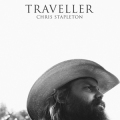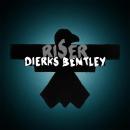Vince Gill & Paul Franklin

Bakersfield
* * * * *
With Bakersfield, Vince Gill and Paul Franklin have created the first perfect country album of 2013. The ten-track collection, a tribute to Buck Owens and Merle Haggard with five songs apiece by each artist, is a masterwork thanks to the flawless combination of song selection, astute musicianship, and vocal prowess.
Initially, I was furious at the prospect of another covers project as they’ve suffocated the genre of late and left little room for talented artists to help push pure country ideals into the twenty-first century. Lee Ann Womack gets it – instead of covering songs, why can’t these artists evoke the signature style on newly written material? The experience would be far richer than another dip in the lukewarm waters of the country music songbook.
Knowing that song selection is key, Gill and Franklin thankfully leave the most iconic Owens and Haggard hits on the table, making room for some lesser known songs, and three choice album tracks that were never singles. By dipping deeper into the pool they display a keen sense of imagination and effort towards the project that’s both honest and refreshing.
Of big hits they do have a few. “Branded Man,” A #1 Haggard single from 1967, is nicely updated with a memorable guitar lick from Franklin, that Gill doubled in time during the recording process. They honor the original by still making it a classic Gill record. Also excellent is their rendition of “The Fightin’ Side of Me,” a lyric that remains timeless, even after forty-three years. Gill had a deep emotional connection to the song in the studio that comes out in his straightforward vocal. I also love how they tweaked the opening to make it their own, adding Franklin’s bright steel behind Gill’s always-masterful guitar licks.
As if I couldn’t love Emmylou Harris any more, her presence in country music helped inspire two of the album’s most sublime moments. In her glory days, she recorded Owens’ “Together Again” and Haggard’s “The Bottle Let Me Down,” and Gill does the same here, making good on his promise to her that he would honor this important music. Gill and Franklin turn “Together Again” into a honky-tonk wonder, anchored by Gill’s otherwordly vocal (that channels Owens in all the best ways), and Franklin’s stunning backdrop of pedal steel. Their lively take on “The Bottle Let Me Down” is pure genius, and a wonderful compliment to “Together Again.”
In honoring the Bakersfield sound this record inspires, Gill and Franklin cover the gateway Owens tracks that helped Gill appreciate how the West Coast was influencing country music back in the early 1960s. You can also hear Owens in Gill’s vocal on “Foolin’ Around,” so much so you may wonder who that guy is singing. It opens the record in stunning fashion, showcasing Gill’s fine interpretation skills on guitar – Owens record was centered around steel, so it gave Gill room to create. “Nobody’s Fool” is just as wonderful a country shuffle, nicely complementing “Foolin’ Around.” Gill says he drew from George Jones for his beautiful electric guitar work here, and that cross genre influence helps the song stand out on its own.
What’s great about Bakersfield is the lesser known tracks, moments that allow Gill and Franklin to show off their stunning prowess without fear of tampering with an iconic standard. “He Don’t Deserve You Anymore” is a perfect weeper, with damn near brilliant guitar and steel work to offset Gill’s awe-inducing vocal. Owens co-wrote the track with Arty Lange and it’s a shame it wasn’t picked up by anyone before now, as songs in this style, no matter how old, need to be heard by younger ears. Tommy Collins’ “But I Do,” an unreleased song of Owens’ from 1963, has a spectacular twin-fiddle opening courtesy of The Time Jumpers’ Tommy Franklin and Joe Spivey before morphing into a moment of pure honky-tonk bliss.
A go-to song for Gill in his club days, “Holding Things Together” is the lone unreleased Haggard track and a stunning ballad about a family on the brink of collapse. The ending gives way to a gorgeous jam session with Gill bringing out his Stratocaster, which is a nod to Reggie Young who introduced the guitar to Haggard and helped define his sound in the 1970s.
As if it’s even possible, the CD has one major highlight – a spot shining so bright, it overtakes the other tracks, flawless as they are. I was first introduced to Haggard’s 1970 #3, on LeAnn Rimes’ Gill co-produced Lady & Gentleman and since then I’ve been obsessed with “I Can’t Be Myself.” Gill’s been playing the song since he heard it on a Steve Young album as a late teen, and gives the track an “El Paso” type feel to honor iconic country music sessions guitarist Grady Martin, who played on Marty Robbins’ hit as well as Loretta Lynn’s “Coal Miner’s Daughter” and Sammi Smith’s hit recording of “Help Me Make It Through The Night,” among others. Those facts don’t change, but only enhance the fact that, Gill has turned in an iconic recording here that’s as important and significant as any of his biggest hit records.
I love this album so much, I just jumped online and bought the project on vinyl. I can’t help but long to hear Gill’s exceptional guitar work and Franklin’s flourishes of steel and guitar coming through those speakers courtesy of a needle. Call me old fashioned at 25, but I don’t care – Bakersfield is a project that begs for such treatment. I’ve come to hold Gill in the highest regard among living country singers since he stopped courting the masses and made projects that help build his legacy, and he only succeeds in adding to my admiration with each of these ten songs.
I don’t praise a project lightly, and have found my ability to be impressed harder and harder to fully satisfy with each passing year. But I mean it when I throw around phrases like “stunning,” “brilliant,” and “flawless.” Gill (and now Franklin, whom I’ve never paid close attention to) is a national treasure. Between his solo work, affiliation with The Time Jumpers, and time in the studio with newer artists like Ashley Monroe, he’s elevated himself into a national treasure as important to country music The Carter Family and Hank Williams, Sr.
I cannot wait to hear what projects he has cookin’ (I believe a bluegrass album is up next) as he looks to be giving his fans little musical treats that show he’s just getting better and better with each passing year. I applaud you MCA Nashville for not letting him get away.
Go pick up Bakersfield. It is impossible to feel even the slightest bit disappointed. Maybe it is, but only if you don’t have a pulse.



















